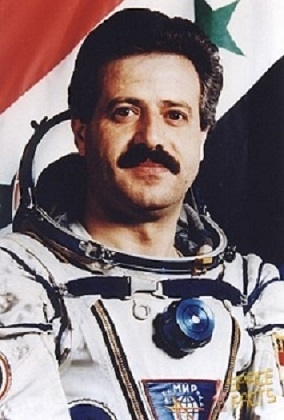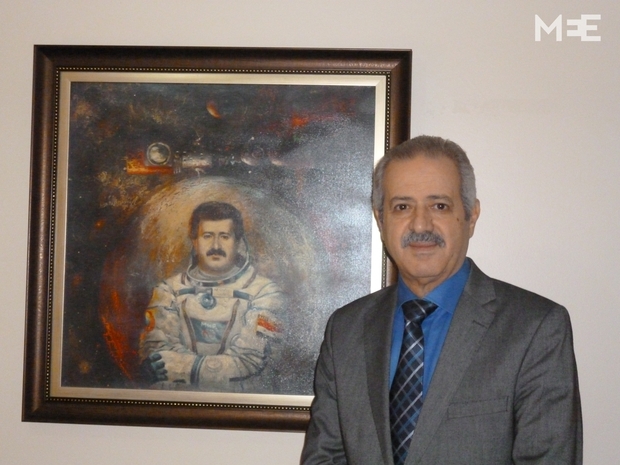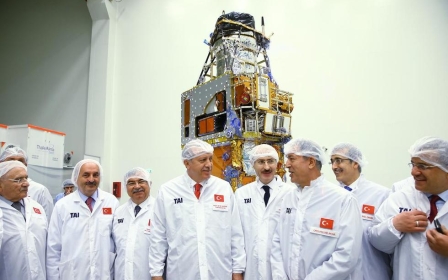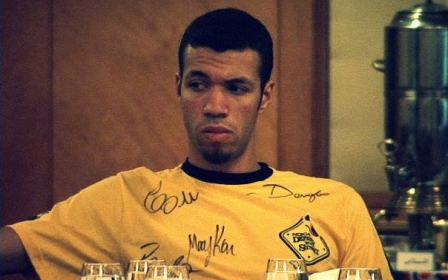Syrian in space: From cosmonaut hero to refugee
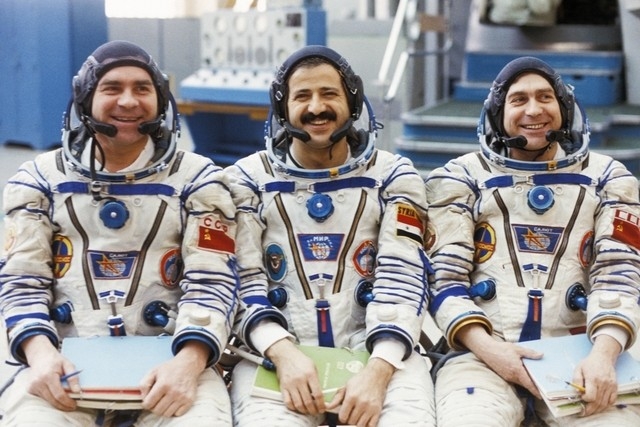
The training and preparation required to become a cosmonaut is believed to be one of the most arduous and difficult in any field. But ask Mohammed Faris and he will tell you it's a stroll in the park when compared to the emotional hardships that come with becoming a refugee.
He should know. Faris, 65, is widely revered among his fellow citizens for becoming the first and only Syrian to travel to space in 1987. He was greeted by thousands lining the streets upon his return. He had streets, schools and even an airport named after him in his honour.
“Training for space was very difficult but now when I think about it, it was very easy compared to what I, my family in Syria, and my fellow Syrians have had to endure over the past few years,” Faris tells Middle East Eye.
“I underwent that rigorous cosmonaut training with pride, ambition and hope for both myself and the prestige of my people. But what we are faced with today is completely blanketed in hopelessness,” he says.
The beginning of the journey
Faris, who hails from Aleppo, joined the Syrian Air Force Academy in 1969 at the Neirab air base and graduated as a military aviator in 1973. He then joined the Baath party and began serving in the Syrian Air Force as a pilot and instructor.
In 1985, following a stringent selection process, he was selected for the Soviet Interkosmos space programme. He spent three years training at Star City, home to the Yuri Gagarin Cosmonaut Training Centre, in the Soviet Union.
On 22 July 1987, he travelled to the Mir Space Station along with Russian cosmonauts Alexander Stepanovich Viktorenko and Alexander Pavlovich. He spent more than seven days in space.
He was awarded the Hero of the Soviet Union and the Order of Lenin medals.
Upon his return to Syria he settled in Aleppo and rejoined the Syrian Air Force with the rank of general, where he trained fighter pilots.
Flight and living in ‘Little Syria’
The final straw for Faris, however, was when the Syrian Air Force began bombing its own citizens in the wake of the 2011 uprisings in the country.
He says the situation in Syria was never good - except for the privileged elite - but the real cruelty of the Assad government surfaced when it started ruthlessly targeting its own citizens.
“There were these pilots, some of whom I had trained myself, who were bombing our own people. It was unbearable and unacceptable.
“They were kept in isolation and we weren’t given the chance to have contact with them. They were totally brainwashed into believing that if they didn’t carry out these strikes the Sunnis would kill them all,” Faris tells MEE.
He attempted to flee to neighbouring Turkey several times but says he wasn’t successful because he was kept under close surveillance. He finally managed to cross into Turkey on foot with his family in 2012, along with whatever meagre material possessions he had managed to salvage.
He was debriefed by Turkish authorities and intelligence due to his high profile and then made his way to Istanbul, where he currently resides.
His lifestyle in Istanbul is a far cry from what he was used to back home when he was considered a national hero. Here, he lives in modest lodgings with his wife and four children in the working-class and conservative neighbourhood of Fatih.
The area has taken on the moniker of “Little Syria” due to its large Syrian refugee population where Arabic shop signs are almost as abundant as their Turkish counterparts.
“I remember telling my children that we would return to Syria in a month at the latest when we were about to leave. How mistaken I was.”
He makes an active effort to keep things in perspective though. “Every time I feel sorry for the state I find myself in, I just need to remember the thousands of my compatriots living in makeshift tents with no water and no electricity. And even worse, my compatriots back home who have to suffer from the constant threat of death,” says Faris.
‘No one cares about fate of Syrians’
In Faris’ view, the war in Syria has become one between international powers and their interests, and one where the fate of Syrians is now simply an afterthought.
He is increasingly wary of the intentions of Western nations and says none of them can be trusted, and that none of them mean anything they say.
Faris maintains a fondness for his Russian colleagues with whom he underwent space training but stresses that seeking refuge in Russia is out of the question.
“My Russian friends often call me and tell me I am most welcome to go there. But I tell them that is impossible as long as their politicians keep propping up the brutal dictator Bashar al-Assad, who is murdering our people,” says Faris.
Faris says he chose Turkey because of its physical and cultural proximity to Syria but also because he believes that Turkey’s Syria policy is one of the few that has the interests of Syrians at heart.
“I have also received invitations from Western countries to live there but I want to be here where I can try to at least do something for the liberation of my country. In any case, they just want to use me as a token to conceal their apathy toward my country and my people.”
'I would rather die than go back under Assad'
Faris is active with a Syrian opposition group called the Syrian National Coordination Committee for Democratic Change. It is based largely in Spain and Turkey.
Faris says his role within the group is currently a political one since the opposition lacks an air force, but he would be more than willing to share his military expertise if the situation were to change.
He is pessimistic about the war coming to an end anytime soon, and is resigned to many years of living in exile.
“I would rather die than go back to an Assad-run Syria,” he says with a steely look in his eyes.
Yet, he does admit to a sense of melancholy when he reminisces about his achievements and the fulfilment of his childhood dreams.
“I am very proud of what I have achieved. Children all over the world dream of travelling to space and I managed to do it. It brought great personal honour to both myself and my country; but I would give it all up if it meant my people didn’t have to go through this,” says Faris.
“I have no personal ambitions at my age. I just want to spend a few years in peace at home in a country where my people are free and our children can go about their lives with hope.”
In the meantime, Faris’ message to his compatriots currently active in the Syrian Air Force is: “Please stop bombing your fellow citizens. The women and children being bombed are no different to your own mothers, wives and children.”
“We are all Syrians regardless of ethnicity and religion. Stop listening to the lies of the Assad regime.”
Middle East Eye propose une couverture et une analyse indépendantes et incomparables du Moyen-Orient, de l’Afrique du Nord et d’autres régions du monde. Pour en savoir plus sur la reprise de ce contenu et les frais qui s’appliquent, veuillez remplir ce formulaire [en anglais]. Pour en savoir plus sur MEE, cliquez ici [en anglais].



